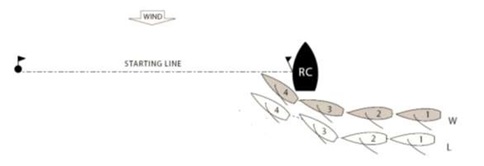


CASE 146
Definitions, Room
Rule 11, On the Same Tack, Overlapped
Rule 16.1, Changing Course
Part 2, Section C , Preamble
Rule 43.1(a), Exoneration
Rule 43.1(b), Exoneration
When boats are approaching a starting mark to start and a
leeward boat luffs, the windward boat is exonerated by rule
43.1(b) if she breaks rule 11 while sailing within the room to
which she is entitled under rule 16.1.
Facts
Two boats, L and W, were approaching the race committee signal vessel,
overlapped on starboard tack, ten seconds before the starting signal. As W
was passing astern of the committee vessel, L luffed. W luffed slightly but
was unable to respond further to L’s luff without hitting the committee
vessel. L bore away to avoid contact. L protested.
 The protest committee disqualified W under rule 11, claiming that she
should not have sailed between L and the committee vessel and that she was
‘barging.’ W appealed.
The protest committee disqualified W under rule 11, claiming that she
should not have sailed between L and the committee vessel and that she was
‘barging.’ W appealed.
Decision
The race committee vessel was both a mark and an obstruction for L and W
(see the definitions Mark and Obstruction). However, because the
committee vessel was surrounded by navigable water and L and W were
approaching it to start, the rules in Section C of Part 2 (specifically rules 18
and 19) did not apply. Accordingly, L was under no obligation to give W
room to pass to leeward of the committee vessel.
At positions 1 and 2, L was able to sail her course with no need to take
avoiding action and could change course in both directions without
immediate contact. Therefore, W was keeping clear as required by rule 11
(see the definition Keep Clear).
When L luffed at position 3, she was required by rule 16.1 to give W room
to keep clear. This obligation applies even when boats are passing the
committee vessel and are about to start. ‘Room’ is the space W needed to
keep clear of L while also complying with her obligations under the rules of
Part 2, which includes rule 14, and rule 31. See Case 114.
When L luffed, W luffed as far as she could without risk of touching the
committee vessel which would have broken rule 31. By bearing away, L
gave W room to keep clear as required by rule 16.1.
At position 3, L was unable to ‘sail her course with no need to take avoiding
action;’ therefore, W broke rule 11. However, W’s breach was a
consequence of the incident (shown in the diagram) with L, ‘a boat required
to give [W] room’; and, because W was sailing within the room to which
she was entitled under rule 16.1, she was exonerated by rule 43.1(b).
W’s appeal is upheld, the decision of the protest committee is reversed, and
W is reinstated in her finishing place.
Note: The term ‘barging’ is not used in The Racing Rules of Sailing. The
term is commonly used to refer to the situation where a leeward boat is
holding her course and a windward boat chooses to sail between the
committee vessel and the leeward boat and either hits the leeward boat or
forces her to bear off to avoid contact. In such a case the windward boat
breaks rule 11 and is not exonerated because she was not compelled to sail
between the committee vessel and the leeward boat and she was not sailing
within room to which she was entitled (see rules 43.1(a) and 43.1(b)).
USA 2018/117




